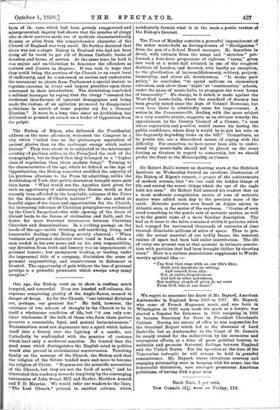Our age, the Bishop went on to show , is restless,
much tempted, and sorrowful. Even our boasted self-reliance, the supreme conquering quality of the Anglo-Saxon, seemed in danger of decay. As for the Church, "our internal divisions are, perhaps, our greatest foe." He held, however, the existence of two schools of thought in the Church to be in itself a wholesome condition of life, but "it can only con- tinue wholesome if the bulk of those who form those parties preserve a reasonable, loyal, and mutual harmoniousness." Protestantism must not degenerate into a spirit which lashes itself into a frenzy over the lighting of a candle, nor Catholicity be confounded with the practice of customs which have only a mediaeval sanction. He trusted that the good sense which distinguishes the English mind in politics would also prevail in ecclesiastical controversies. Touching finally on the message of the Church, the Bishop said that the religion of the future tended more and more to become the religion of Christ. " Dogmas are the scientific necessities of the Church, but they are not the food of souls," and he illustrated this tendency towards simplicity by the converging testimonies of John Stuart Mill and Baxter, Matthew Arnold and F. D. Maurice. We would refer our readers to the lines, "The Last Church," printed in another column, which
accidentally furnish what is in the main a poetic version of the Bishop's forecast.






































 Previous page
Previous page